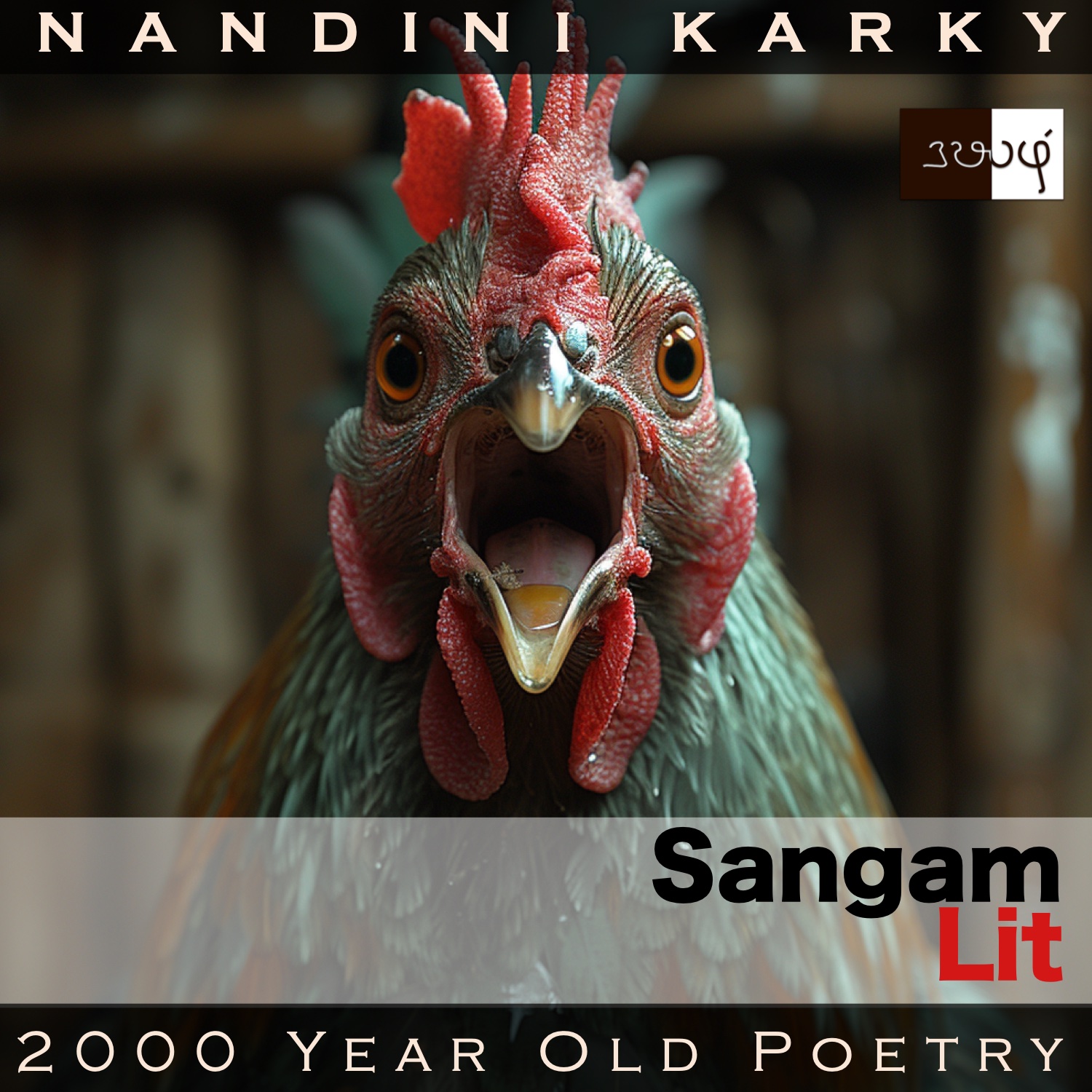Podcast: Play in new window | Download
Subscribe: Apple Podcasts | Spotify | Amazon Music | Android | iHeartRadio | TuneIn | RSS | More
In this episode, we perceive the noble virtues of a couple as depicted in Sangam Literary work, Puranaanooru 326, penned by the poet Thangaal Porkollanaar. The verse is situated in the category of ‘Vaagai Thinai’ or ‘Victory’ and presents a vivid scene around a Sangam home in the woods.

ஊர் முது வேலிப் பார் நடை வெருகின்
இருள் பகை வெரீஇய நாகு இளம் பேடை
உயிர் நடுக்குற்றுப் புலா விட்டு அரற்ற,
சிறையும் செற்றையும் புடையுநள் எழுந்த
பருத்திப் பெண்டின் சிறு தீ விளக்கத்து,
கவிர்ப் பூ நெற்றிச் சேவலின் தணியும்
அரு மிளை இருக்கையதுவே மனைவியும்,
வேட்டச் சிறாஅர் சேண் புலம் படராது,
படப்பைக் கொண்ட குறுந் தாள் உடும்பின்
விழுக்கு நிணம் பெய்த தயிர்க் கண் மிதவை,
யாணர் நல்லவை பாணரொடு, ஒராங்கு
வரு விருந்து அயரும் விருப்பினள்; கிழவனும்,
அருஞ் சமம் ததையத் தாக்கி, பெருஞ் சமத்து
அண்ணல் யானை அணிந்த
பொன் செய் ஓடைப் பெரும் பரிசிலனே.
A verse that makes you feel as if you are in the midst of a midnight prowl! The poet’s words can be translated as follows:
“Near an age-old fence around town, strides a nimble-footed wild cat. Fearing its enemy in the dark, a young female hen trembles and starts crying out, opening its throat wide. To clean and clear the debris of cotton seeds, rises a cotton working girl and she lights up a small lamp. In the light of this lamp, seeing the rooster with a comb, akin to a coral flower, the hen’s fear subsides, in that place surrounded by rare sacred forests. Here, the wife takes the short-legged monitor lizard, which was caught by the hunter’s children, without going afar, within the village itself, and adds that fatty meat to curd to prepare a flavourful dish along with many other delicacies. She then wishes to spread this feast for bards who come there seeking. As for her husband, in the midst of a huge battle, he attacks with fierceness, and brings home the golden ornament worn by the esteemed elephant to give away as a great gift to those very bards!”
Let’s delve into and delight in these details. The poet starts by focusing on a fence laid around the village and describes it as being there from ancient times. This casual observation tells us that the village being spoken about here had been settled long ago in a period much before this Sangam era, which happens to be ancient to us. Returning to reality from the wonder of the archaeological revelation in these lines, we see an intense wild cat prowling around near the fence. Or maybe it appears so in the mind of a young hen inside the village. This hen, thinking about the wild cat’s intentions, is filled with worry about its little ones, and with its entire life on a quiver, it starts crying out aloud, as if its throat is about to be torn with that effort. Either startled by that sound or on her own accord, a girl who had been spinning cotton, rises up to clear the debris all around because of the sifting of the cotton and dropping of the seeds within. It’s dark and so she lights up a lamp. Now, in the glow of that light, our frightened hen catches a glimpse of its mate, the rooster, whom the poet describes as having flowers from the Indian coral tree on the top of its head. If you pause for a moment and check out this tree, also known as ‘tiger claw tree’, you will be amazed by the similarity of the tree’s radiant red flowers and the comb atop a rooster’s head.
Reverting to where we left off, that frightened hen seeing its rooster sleeping without a care, as perhaps all males normally do, calms down, the poet connects. He has been describing this fascinating scene only to talk about the village of the lord and turns the attention to the activities of the lord’s wife, who is seen accepting monitor lizards, hunted down by the crafty children of hunters, whom we have been meeting often in these recent verses. The poet adds in nuanced details about their hunt saying they didn’t even have to go far for it, and found what they wanted within the village itself. Taking the flesh of that prey, the lady then mixes that with curd and prepares a delicious dish with many other accompaniments, adds the poet. She does this not because she or her family can gorge on it but because she wants to spread a feast to supplicants who came seeking the lord’s patronage. If that’s her attitude, as for her husband, the lord, he is one who fells the enemy king’s elephants in the battlefield and returns claiming the rich golden ornaments worn by those battle beasts. He too, does not want to hoard those trophies for himself but gives it away to those bards who come to his door, the poet concludes.
And thus, we find that these Sangam people, be it men or women, were of one mind, when it came to showering hospitality on those who came to their homes. That was the prime mover of all their actions in life, at least according to the Sangam poets we have read. A fascinating verse which reveals to us, facets about animals in the wild and at home, meaty delicacies and motivations of a single-minded Sangam couple!




Share your thoughts...